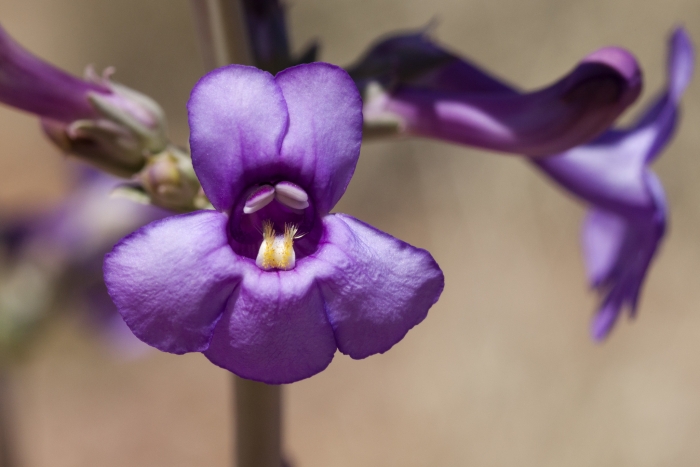Fendler’s Penstemon
(Penstemon fendleri)
Fendler’s Penstemon (Penstemon fendleri)
/
/

Cecelia Alexander
Public Domain
Image By:
Cecelia Alexander
Recorded By:
Copyright:
Public Domain
Copyright Notice:
Photo by: Cecelia Alexander | License Type: Public Domain | License URL: http://creativecommons.org/publicdomain/zero/1.0/ | Rights Holder: Cecelia Alexander | Publisher: iNaturalist | Date Created: 2016-03-27T12:46:47-07:00 |













































Estimated Native Range
Summary
Penstemon fendleri, commonly known as Fendler’s Penstemon, is a perennial herb that can be deciduous or semi-deciduous, depending on the climate. It is native to open woodlands, grasslands, and scrubby areas in the South Central and Southwestern United States, particularly thriving in the rocky and well-drained soils of these regions. This plant typically grows to a height of 1-3 feet (0.3-0.9 meters) and a width of 0.3-0.7 feet (0.09-0.2 meters), with a clumping form that adds texture to garden beds.
Fendler’s Penstemon is valued for its tubular, purple flowers that bloom profusely in the spring and summer, attracting pollinators such as bees and hummingbirds. The flowers are quite showy, making it a favorite for native plant gardens, rock gardens, and borders. It is also used for xeriscaping due to its drought tolerance. In terms of cultivation, it requires full sun and well-drained soil, and it is highly adaptable to poor, rocky soils. It has very low water needs once established, making it an excellent choice for water-wise gardening. While generally disease-free, it can be susceptible to root rot if overwatered or planted in poorly drained soils.CC BY-SA 4.0
Fendler’s Penstemon is valued for its tubular, purple flowers that bloom profusely in the spring and summer, attracting pollinators such as bees and hummingbirds. The flowers are quite showy, making it a favorite for native plant gardens, rock gardens, and borders. It is also used for xeriscaping due to its drought tolerance. In terms of cultivation, it requires full sun and well-drained soil, and it is highly adaptable to poor, rocky soils. It has very low water needs once established, making it an excellent choice for water-wise gardening. While generally disease-free, it can be susceptible to root rot if overwatered or planted in poorly drained soils.CC BY-SA 4.0
Plant Description
- Plant Type: Herb
- Height: 1-3 feet
- Width: 0.3-0.7 feet
- Growth Rate: Moderate
- Flower Color: Purple
- Flowering Season: Spring, Summer
- Leaf Retention: Deciduous
Growth Requirements
- Sun: Full Sun
- Water: Very Low, Low
- Drainage: Fast
Common Uses
Bee Garden, Bird Garden, Butterfly Garden, Deer Resistant, Drought Tolerant, Groundcover, Hummingbird Garden, Low Maintenance, Rabbit Resistant, Showy Flowers
Natural Habitat
Native to open woodlands, grasslands, and scrubby areas in the South Central and Southwestern United States
Other Names
Common Names: Fendler’s Beardtongue
Scientific Names: Penstemon fendleri , Penstemon acuminatus var. fendleri
GBIF Accepted Name: Penstemon fendleri Torr. & Gray